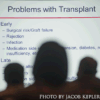HM14 Special Report: The Future of the Healthcare Marketplace
A Scot who describes himself as a “professional futurist,” Ian Morrison, MD, helped HM14 get off to a start with laughter. Describing the background of the changes leading to the Affordable Care Act (ACA), Dr. Morrison repeated his key point several times: “We’ve got to change the delivery system.”
This overview is very timely as the deadline for enrollment to comply with the Affordable Care Act is March 31, 2014. Dr. Morrison cited that as of March 11, more than five million Americans have enrolled in exchanges and over 80% of them have paid premiums. Up to 14 million Americans are eligible for Medicaid expansion programs. It is unknown how many of these people were previously uninsured.
Dr. Morrison described several key current issues, including:
1. There are “two Americas”—those states expanding Medicaid and those states declining any expansion;
2. The ACA is the “the Law of the Land.” The difficult task is now implementing this large change in the industry;
3. Accountable Care is a megatrend, but accountable care organizations may not continue in the form they are now;
4. Pressure on costs and delivering value is intensifying;
5. Medicare is still a major part of the healthcare system. “Learning to live in Medicare” means taking out 10% to 20% of costs; and
6. There is a renewed focus on primary care.
Dr. Morrison shared a vision of the future as these trends continue. There will continue to be “massive consolidation” in which there may be only 100-200 large regional healthcare systems in the U.S. Related to this linked care, clinical protocols will be more widely used. Care coordination of transitions will be at a premium. The transition of moving away from hospital admissions to more home care will be economically and culturally challenging.
As a transition to the future of healthcare, Dr. Morrison reviewed the concept of “the second curve” in business. Most hospitals have mastered the first curve of volume-based care, which is daily business and operations. The second curve, which is more value-based care, is a new way of doing business. Individual hospitals and healthcare systems must plan for, and succeed with, the second curve to survive. Dr. Morrison said this pressure on the healthcare system and the second curve is real, stating, “We turned the corner and we ain’t going back.”
Public purchasers will continue to play a growing role in the future. Dr. Morrison explained why Medicare Advantage is so resilient. Public employers have huge retiree health benefit problems. Dr. Morrison predicts that public payers will be more dominant by 2020 and public exchanges will grow after a rocky start.
Even with a disruptive start to the healthcare exchanges, Dr. Morrison encouraged the audience to think of the long-term benefits of the healthcare system changes.
He envisions four scenarios for the exchanges:
1. Managed competition nirvana. In this system, both public and private exchanges can grow;
2. Minor miracle. This is where the system is now at the start of exchanges;
3. Single-payer system. This would enable public exchanges to continue to grow and succeed; and
4. Meltdown, caused by patient- and system-risk or politics.
The work of the future is the transformation of the delivery system. This difficult work includes the centrality of clinical integration, information technology, “learning to live on Medicare”, managing a business model migration (from curve 1 to 2), and finally, building a culture of quality and accountability.
Dr. Morrison ended this enlightening session with several ACA implications and roles for hospitalists:
1. Take the long view. This is an area where hospitalists can continue to be leaders

